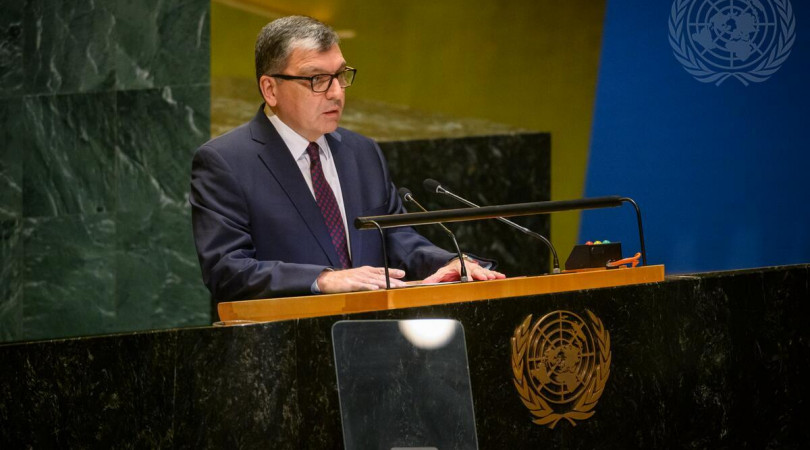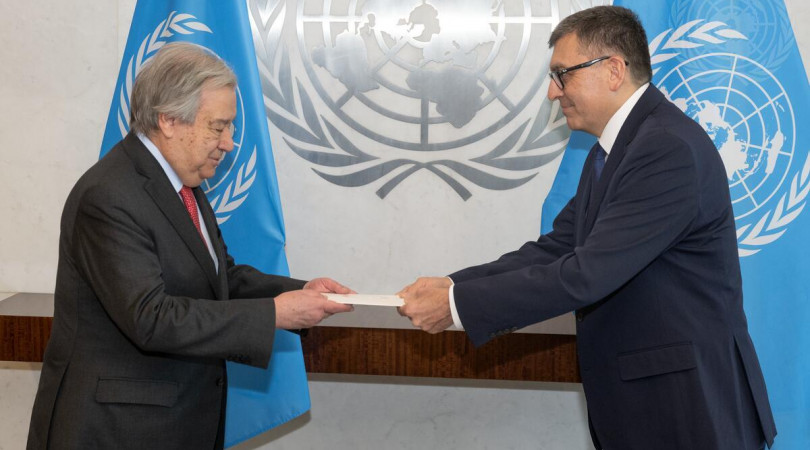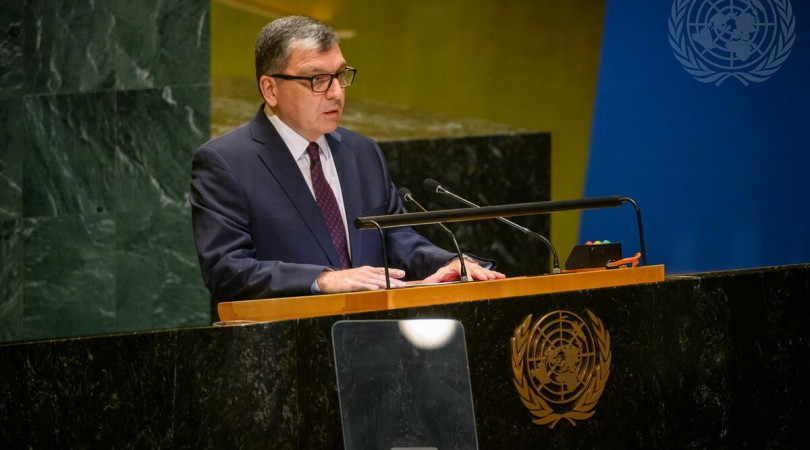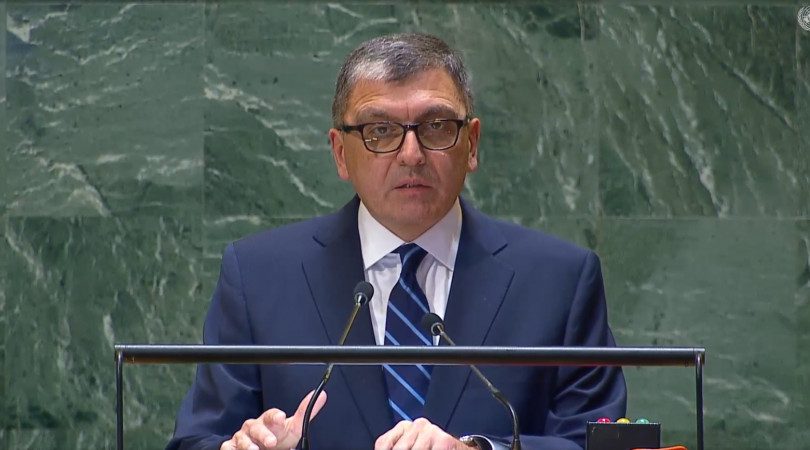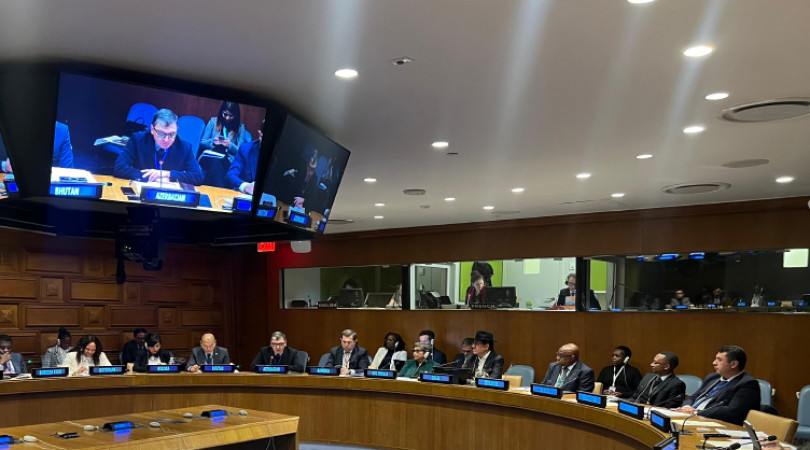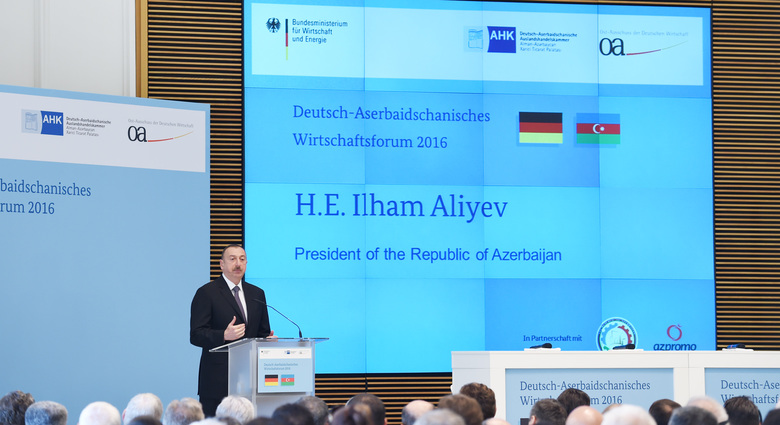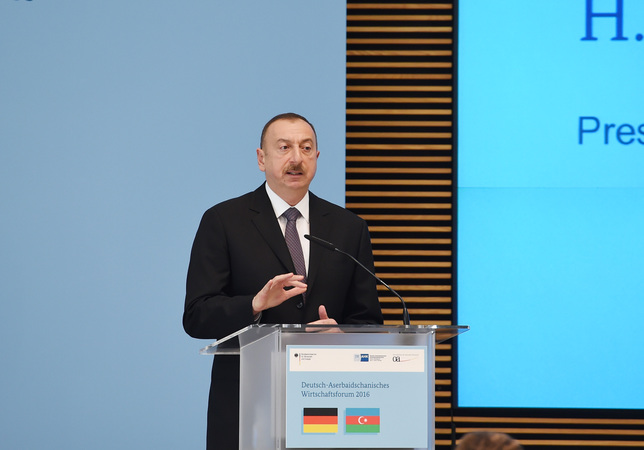Ilham Aliyev attended the opening of Azerbaijani-German Economic Forum in Berlin
The German-Azerbaijani Economic Forum has kicked off in Berlin.
President of the Republic of Azerbaijan Ilham Aliyev attended the opening ceremony of the forum.
Greeting President Ilham Aliyev, Vice-Chancellor of the Federative Republic of Germany Sigmar Gabriel hailed the organization of the forum. He expressed his confidence in the success of the Formula 1 Grand Prix of Europe to be held in Baku in a few days.
Highlighting the importance of the Southern Gas Corridor project, Sigmar Gabriel described it as a new project which would deliver the hydrocarbon resources of the Caspian Sea to Europe.
The Vice-Chancellor praised Azerbaijan's achievements, saying that the country ranked first in the world for its economic development. He underlined the successful operation of German companies in Azerbaijan. Mr. Gabriel expressed his concern about the Armenian-Azerbaijani Nagorno-Karabakh conflict, which he described as the greatest challenge facing Azerbaijan. He said there was optimism about the settlement of the dispute after the Vienna meeting.
President Ilham Aliyev addressed the forum.
Speech of President Ilham Aliyev
Mr. Vice-Chancellor,
Ladies and gentlemen,
First of all I would like to thank you for being today with us. As Mr. Vice-Chancellor said I was very impressed with this building. But not only with the building, but also with the audience. It shows that there is a big interest between business circles of our countries to do business, to expand our economic cooperation. I am sure that results of the business forum will lead to greater cooperation between our countries and companies.
Germany and Azerbaijan are good partners, we cooperate in many areas. We have very active political dialogue. I visited Germany last year, I`m visiting now. So it shows that we have a very active political communication, which is also very important for development of economic ties. For our economy and for future development of our country stability and security is one of the most important issues as for any other country. Azerbaijan lives in peace for almost more than twenty years since the ceasefire regime between Azerbaijan and Armenia was established in 1994. But this peace is fragile. And the recent developments on the line of contact show that the conflict between Armenia and Azerbaijan is not frozen and it must be resolved.
In the beginning of April Armenia launched military provocation against Azerbaijan. We had to respond and defend our civilians, our cities, our villages and our military positions. The result of the clashes in April shows that Armenia is no longer able to control the situation and to keep status-quo unchanged. Status-quo must be changed as soon as possible. Minsk Group of OSCE is dealing with this issue and the presidents of the countries chairing the Minsk Group - the United States, France and Russia – many times made public statements that status-quo is unacceptable. And Germany as a chair of OSCE also made a statement. Minister Steinmeier was very clear saying the status-quo must be changed. What does it mean? The change of status-quo means the beginning of de-occupation of internationally recognized territories of Azerbaijan. We live under occupation for more than twenty years. Nagorno-Karabakh and seven other districts of Azerbaijan are occupied. Everything is destroyed, we were subject of ethnic cleansing, all the Azerbaijanis were expelled from those territories and almost twenty percent of our lands is under occupation, more than one million people became refugees and IDPs.
Now we see that there is a big concern in many European countries with respect to migrants. But can you imagine that in the beginning of our independence, when we were poor, disorganized, without any real means for development, we had this humanitarian catastrophe? Million people out of eight million population at that time became homeless. International organizations address this issue and we support and appreciate that.
United Nations Security Council adopted four resolutions demanding withdrawal of the Armenian troops. But they are not implemented and there is no mechanism of implementation. Unfortunately, sanctions are not imposed on Armenia to implement Security Council resolutions. And we face double standard policy here because in some cases Security Council resolutions are implemented within days. In our case they are on paper for more than twenty years. In other words, a soonest resolution of the conflict based on Helsinki final act, United Nations Charter, United Nations Security Council resolutions, based on territorial integrity of Azerbaijan, will serve stability, predictability, and economic development of the region of the South Caucasus. Despite this heavy burden, Azerbaijan managed to develop successfully. Twenty-five years of independence, which we celebrate this year, show that we can live based on our values, our vision, our traditions and our plans to establish a strong, independent, sovereign state. These years were the years of transformation – political and economic transformation.
We implement the policy of political and economic reforms, all the fundamental freedoms are provided in Azerbaijan, including freedom of media. We have free internet, without censorship. More than 75 percent of our population are internet users. We have free political activity, freedom of assembly, religious freedom. This year in Azerbaijan is declared a year of multiculturalism, and Azerbaijan is a good example of peaceful co-existence between representatives of different religions and ethnic groups.
Of course, economic transformation because without economic independence we cannot achieve political independence. If we depend on some other countries and cannot be self-sufficient then our space for conducting independent policy would be very narrow. Therefore, we largely invested in development of Azerbaijan, we used the period of ceasefire with Armenia to develop the country, and we have, I think, very good results. Now Azerbaijan is a modern, developing, self-sufficient country with diversified economy, a country which leads implementation of the global energy and transportation projects and which got a very good reputation in the world.
Several years ago, 155 member countries of United Nations elected Azerbaijan as a non-permanent member of Security Council of United Nations. So this is international support and appreciation of what we are doing. During the last 10-12 years, our economy was rapidly growing, mainly driven by the increase of oil production and not only. So economic growth in Azerbaijan since 2004 was 300%. We managed to reduce dramatically the level of poverty and unemployment, which is now around 5% both. Our economy became more competitive because we started to invest funds which we receive from oil sales into non-oil sector. And now based on Davos World Economic Forum assessment, Azerbaijan’s economy is number 40 on a global competitive index of economies of the world.
Of course, energy development and energy factor is important for us. And not only for us. Now it’s also important for other countries. Since 1994, Azerbaijan has been implementing mega energy projects, construction of the oil pipelines in first place, connecting Azerbaijan with Black Sea and Mediterranean Sea. And now some European countries have about 30 percent of oil in their energy balance coming from Azerbaijan. Since 2012, we have implemented the project of construction of the gas pipeline to neighborhood and to Europe. We actually already have several gas pipelines, which allow us to export our gas to neighbor countries like Georgia, Turkey, Russia and Iran. In all four directions we export natural gas. And now we are implementing together with our partners the project of the Southern Gas Corridor, which started in 2012, when Azerbaijan and Turkey signed an agreement on Trans-Anatolian pipeline construction. Since that time, many other projects have been initiated, including the one which Mr. Vice-Chancellor referred to. The construction of Trans Adriatic Pipeline started. It is just a part of the Southern Gas Corridor project, which consists of four projects – production of gas from one of the biggest gas fields in the world, Shahdeniz, construction of the pipeline connecting Azerbaijan with Georgia and Turkey, then the pipeline from Eastern to Western borders of Turkey, which is called TANAP, and from Turkish-Greek border to Italy, another pipeline which is called TAP - Trans-Adriatic Pipeline.
All these projects are being implemented in coordination with our partners. Seven countries participate in this project. Three of them are members of EU. European Commission strongly supports our initiatives. We initiated two meetings of the Advisory Council of the Southern Gas Corridor, which took place in Baku this year and last year, where the role of Azerbaijan and the leadership of Azerbaijan was highly appreciated. According to our plans, in two years’ time the pipeline will be in operation connecting Azerbaijan and Turkey and by 2020, Azerbaijani gas for the first time will reach the European market. So for us, it’s an opportunity to diversify our routes of supply. For transit countries it’s an opportunity to earn money and to engage thousands of people in construction and then maintenance of this project. And for consumers it is an alternative source of energy. The advantage of our project is not only diversification of routes, but it is diversification of sources, which is more important.
We have large gas reserves. Proven reserves of Azerbaijan are 2.6 trillion cubic meters and, I am sure, that with new exploration projects we will definitely have bigger figures in future. But for us now energy factor is not a priority any longer. We concentrate on non-energy sector through diversifying the economy. Today energy factor is only something more than 30 percent in our GDP and less than a half in our revenues. But diversification of our export potential now is an issue number one and we are working closely with international financial institutions to continue to implement important economic reforms on transparency, good governance, stimulation of export, creation of a better investment climate.
Though, since 1995, 200 billion dollars have been invested in Azerbaijan, half of them are foreign investments. Agriculture is the number one among the areas, which we now consider priority because almost half of population lives in rural area and there is a good climatic conditions for that. High technologies, ICT sector is quite developed and Azerbaijan became a country with a space industry, launching two satellites. And this process will continue.
In transportation sector, using our geography, we created a very strong logistic and transportation infrastructure connecting continents. For instance, the project of restoration of the Silk Road started in 2007, when we initiated together with Turkey and Georgia the construction of the railroad between three countries connecting Asia with Europe. And now this project is almost ready and hopefully by the end of this year this route will be opened.
And we already had the first test container trains running from China to Europe through Azerbaijan. So this will be the shortest route from Asia to Europe and backwards. I hope that German companies will take advantage of this situation, which will occur by the end of this year. At the same time, the construction of the biggest sea port on the Caspian, in the area close to Baku, projects to create another corridor from South to North, again using the territory of Azerbaijan. Thus Azerbaijan will be a geographical and logistical center of the region from the point of view of transportation, which will generate not only economic benefits, but also will strengthen cooperation and interdependence. If we want to create stable situation and, I think, all the countries of the region want to do that, we need to have active international cooperation in our region. And the best way is inter-dependence.
Energy projects make all of us dependent on each other. We depend on the markets, market depends on supply. The same with transportation. And that will increase predictability, cooperation between countries and at the same time EU-Azerbaijan relations also will develop more rapidly.
Though today we have already a good record of cooperation. With eight member countries of European Union Azerbaijan signed or adopted documents on strategic partnership. And this is a good base for a general framework of EU-Azerbaijani cooperation.
Tourism is one of the potential areas of cooperation. As Mr. Vice-Chancellor said Formula 1 race, which will start in less than two weeks, of course, will attract a lot of attention to our country. Five hundred million people will watch this race and due to the fact that this will be a city circuit they will see not only stadium and cars, but also the developed city of Baku. I hope that even if one percent of those who will follow the race come to Baku, that will make a big difference for our tourism industry. For tourism we have all the necessary pre-conditions – good location, stable political situation, security and safety, hospitable people, good climate with food and a lot of historical monuments. The only thing we need is to present this to the world, to Europe in order to attract tourists. And, I think, Formula 1 is the best way to do it.
Though last year we hosted in Baku the first European Games for the first time in the history of Olympic movement, which were very successful. And in 2017 we will host the fourth Islamic Solidarity Games, which actually shows that Azerbaijan is part of Islamic culture and at the same time is very closely integrated with European institutions and countries.
I’m glad that 169 German companies work in Azerbaijan. Of course, I want to see more German companies working in our country. They implement very important projects for development of Azerbaijan as contractors. Of course, we want to see them also as investors, taking into account good investment and political climate in Azerbaijan. And the areas, which I mentioned, I think, would be the most attractive. The Southern Gas Corridor project, by the way, is worth 45 billion dollars. And according to my information about quarter of that amount is now contracted. So there is a big potential for German engineering, construction and equipment producing companies to be involved in that. Transportation, high-technologies, space industry, tourism, education, all these areas are priorities for us. And I hope that the results of this forum will lead to greater cooperation between our countries not only in economic area, but in the all areas of our life.
Germany is one of the leading countries in the world, one of the leading countries in Europe. Of course, we want to have closer cooperation with your country and taking into account today’s audience I can see the same approach from your side. So I wish the forum success. We are expecting good results. Thank you.
X X X
Knauf Group CEO, board member of the Committee on Eastern European Economic Relations Manfred Grundke and head of the German-Azerbaijan Chamber of Commerce and Industry Samir Akhundov then highlighted the development of economic relations between Azerbaijan and Germany.

